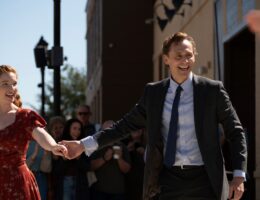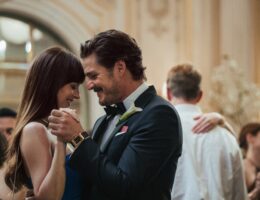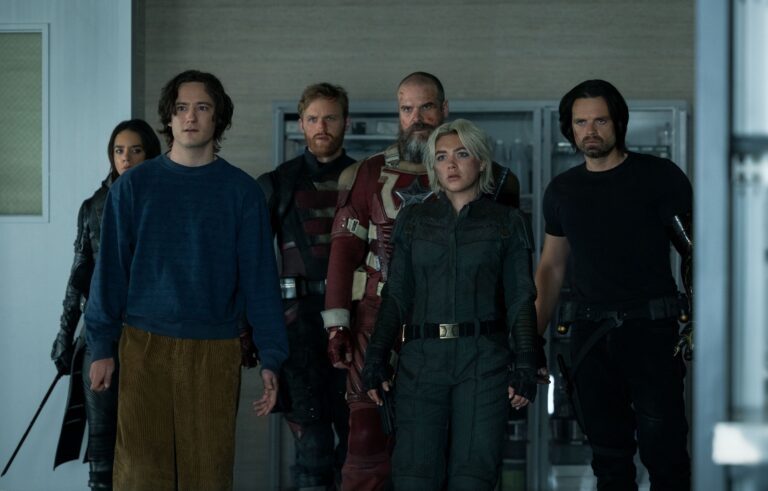Thunderbolts (2025 | USA | 126 minutes | Jake Schreier)
Thunderbolts* opens with a shot of Florence Pugh on the ledge of the 2,227-foot-tall Merdeka Tower in Kuala Lumpur. From this harrowing start to the film’s last scene, the expression on her face perfectly tracks the feeling of watching a Marvel Cinematic Universe film in the year 2025. As the film opens, it’s one of absolute dejection and dutiful dread. Her character Yelena Belova has yet another job to do, but the thrill is long gone, and she’s questioning whether it’s still worth the paycheck.
Who can blame her? Her beloved sister, Black Widow, died undoing Thanos’s Snap more than a dozen movies ago, back when these comic book action comedies actually meant something to the culture. Since then, Yelena’s backstory of being an undercover Russian super soldier’s kid who trained in a harsh assassin academy for promising young murders was a flashback in Black Widow, a passably entertaining pandemic-delayed, day-and-date Disney+ release that sparked a lawsuit from its long-neglected star; other bits and pieces were doled out in Hawkeye, a functional-enough limited series. Like many of us who have spent decades in the Marvel game, Yelena has the acute sensation that something’s gone very wrong, or maybe she’s just bored.
Without spoiling too much, by the end, her expression provides more than a sliver of hope and a dash of reclaimed control. This film, helmed by Beef director Jake Schrier, is far from perfect, but largely thanks to Pugh’s performance and a willingness to break from the formulaic content churn and put a toe into the real world of burnout, isolation, and questioning one’s direction, Thunderbolts* easily clears the very low bar of being among the best Marvel films of this long, soggy stretch.
Working from a script by Joanna Calo and Eric Pearson, the film parachutes Yelena (literally, with practical stuntwork) into yet another mercenary job-for-hire. She’s in Malaysia to scrub a secret lab of all traces of whatever nefarious experiments had been taking place within. When all’s said and done, the opening sequence brings back the quippy action that was once a hallmark of the Avengers franchise, with decent stuntwork, a big explosion that certainly kills a bunch of people within, while still establishing the anti-heroine’s lingering humanity via a rescue of an adorable guinea pig. This is not at all subtle foreshadowing for the rest of the plot.
We soon learn that this clean-up job was yet another for the power-hungry C.I.A. director Valentina Allegra de Fontaine (Julia Louis-Dreyfus, whose government insider here is slightly more effective and every bit as cynical than the one that won her a pile of Emmys in Veep). We meet her at an impeachment hearing back in DC led by “Congressman Gary” (played with about as much gravitas as you’d expect from that credit by Wendell Pierce) that’s digging into her shadowy past as a rich and powerful industrialist of questionable morality. Hers is a worldview of “bad guys and worse guys” where “righteousness without power is just an opinion”. Tough, but the mere idea that doing obscenely evil corporate things on the side while holding a government job could result in any consequences whatsoever suddenly feels like a quaintly optimistic take on what we might hope for for civic life in the year 2028.
The timeline isn’t entirely clear, but based on references to the president having recently turned into Red Hulk and the presence of recently elected Brooklyn Congressman Bucky Barnes (Sebastian Stan), I think we’re meant to understand that this movie takes place after the events of Captain America: Brave New World. Guessing how long is beyond my ability to speculate on the post-Blip election (or even special election) calendars of the Post-Blip Era. It also situates us at a part of the timeline where everyone in power is required by law to say something about how the Avengers aren’t coming back to save anyone, despite there having been over a dozen movies about individual Avengers saving people in the intervening years. There was a Captain America and a Falcon right there in the nation’s capital somewhere from a few months to a year prior, but maybe everyone’s an amnesiac or had the good sense to sit those out.
Alas, after Yelena completes her operation, she pays a visit to her dear old dad, Alexei (David Harbour in desperate clown/perpetual cheerleader mode). The former super soldier’s living on the furthest outskirts of DC, reliving his heyday as Soviet Supersoldier Red Guardian, and running a limousine company. The marketing of this movie pitched it in the vein of an A24 indie, and his shabby apartment, their joint malaise over the disintegrating state of their father-daughter relationship, the course their lives have taken, and the meaningless of the daily grind, all set to an original electro- and orchestral soundtrack by experimental band Son Lux all fits the bill to distinguish it. Generationally attuned to the importance of mental health, Yelena resolves to come out of the shadows and is ready to take a more public-facing “doing good” role.
Her request for a promotion is met with a classic “one last gig for me, one new lease on life for you” agreement. Valentina needs a quickie cleanup of her Evil Corporation’s Underground Secret Lair, with a side of offing a rival operative who’s trying to steal her Evil Secrets. As it turns out, this job is an inadvertent mixer for a bunch of other discredited heroes. There’s John Walker (Wyatt Russell), an ex-military hero who made a brief run as The Next Captain America before his stint was cut short when he murdering a guy in the streets. Ava Starr (Hannah John-Kamen), a walks-through-walls masked operative called Ghost, one that I’d entirely forgotten from a prior Ant-Man engagement, also gets an invite from Valentina’s trusty assistant. True to her superpower, she doesn’t make much of an impression. They all arrive with conflicting motivations, but the most incongruous party guest is a bewildered guy named Bob (Bill Pullman’s son Lewis, truly a film of nepo-boys) in a hospital dressing gown wandering around in a fog of confusion like if Bighead from Silicon Valley had a more severe major depressive disorder, amnesia, even less ambition, and maybe a head injury.
Soon, this collection of sad, lone wolves will find themselves considering whether circumstances might force them into forming a little pack of misfit toys. The downside of juggling so many characters is that the script takes some shortcuts in the rush to introduce a new super-powered adversary. But it’s an appealing enough group, and the talent’s there to paper over storytelling deficiencies. The film’s success relies entirely on Florence Pugh, but she’s surrounded by an appealing cast of good actors who are game for whatever’s required of them. Even when her schemes don’t entirely make sense, Dreyfuss has plenty of fun as a smarmy schemer who’s used to being a half-step ahead and always willing to improvise. David Harbour has a good time clowning it up as a washed-up dad who’s hungry for attention and a third act. Sebastian Stan has done enough of these movies — at one point competing that it all must feel like ancient history — that his Bucky’s world-weary heroism feels well-earned and a welcome distraction from his new congressional homework assignments.
Staging much of the action on real sets rather than green-screened soundstages lends credibility to both the action and keeps the growing camaraderie among the cast grounded in a human scale. Still, one could wish that the studio would invest some of its vast sums in top-end stunt coordination to elevate the set pieces beyond functional to truly breathtaking. With that said, it’s a tremendous relief that the final showdown strays from the too-frequent template of masked heroes dueling in a CGI wonderland with the fate of the Universe hanging in the balance (don’t worry, there’s still a laughable number of New Yorkers with the inability to dodge traffic). At this point, we’re grading on a very generous curve, but situating the primary confrontation with a level of interiority and emotional stakes is a welcome differentiation from an everything-goes-boom aesthetic.
Despite the requisite amount of plot drivel and franchise-building, Florence Pugh manages, over and over again, through pure force of will to establish Yelena as a multi-dimensional character worth caring about. That the emotional crux of the film turns on a father-daughter conversation conducted in very silly Russki accents is part of the game. That it’s so effective is a tribute to the depths that she’s willing to bring to the character. Her efforts are emblematic to the films willing to dial in to a human scale.
By the time the story’s wrapping up, Yelena’s facial expression again echoed my sentiment: we might be stuck with this gang for the long haul, but there’s a decent chance that it could be entertaining. In its necessity to set up the next big thing, the ending is far from perfect, but it rights the sinking ship enough to pique my interest at the prospect of returning for the next one. Even if that isn’t saving the universe, it still has to count for something.
Thunderbolts* arrives in theaters on May 2nd
1 If we’re ranking post-Endgame, I’d rate it above everything but Guardians of the Galaxy volume 3 and any Spider-Men or Spider-verses (which are still technically Sony co-productions).




